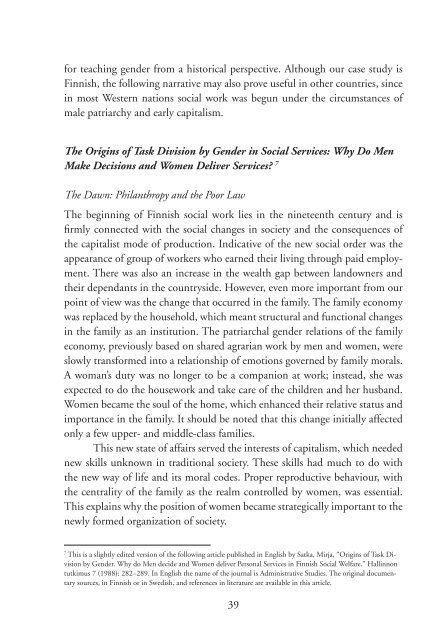Teaching Gender in Social Work - MailChimp
Teaching Gender in Social Work - MailChimp
Teaching Gender in Social Work - MailChimp
Create successful ePaper yourself
Turn your PDF publications into a flip-book with our unique Google optimized e-Paper software.
for teach<strong>in</strong>g gender from a historical perspective. Although our case study is<br />
F<strong>in</strong>nish, the follow<strong>in</strong>g narrative may also prove useful <strong>in</strong> other countries, s<strong>in</strong>ce<br />
<strong>in</strong> most Western nations social work was begun under the circumstances of<br />
male patriarchy and early capitalism.<br />
The Orig<strong>in</strong>s of Task Division by <strong>Gender</strong> <strong>in</strong> <strong>Social</strong> Services: Why Do Men<br />
Make Decisions and Women Deliver Services? 7<br />
The Dawn: Philanthropy and the Poor Law<br />
The beg<strong>in</strong>n<strong>in</strong>g of F<strong>in</strong>nish social work lies <strong>in</strong> the n<strong>in</strong>eteenth century and is<br />
firmly connected with the social changes <strong>in</strong> society and the consequences of<br />
the capitalist mode of production. Indicative of the new social order was the<br />
appearance of group of workers who earned their liv<strong>in</strong>g through paid employment.<br />
There was also an <strong>in</strong>crease <strong>in</strong> the wealth gap between landowners and<br />
their dependants <strong>in</strong> the countryside. However, even more important from our<br />
po<strong>in</strong>t of view was the change that occurred <strong>in</strong> the family. The family economy<br />
was replaced by the household, which meant structural and functional changes<br />
<strong>in</strong> the family as an <strong>in</strong>stitution. The patriarchal gender relations of the family<br />
economy, previously based on shared agrarian work by men and women, were<br />
slowly transformed <strong>in</strong>to a relationship of emotions governed by family morals.<br />
A woman’s duty was no longer to be a companion at work; <strong>in</strong>stead, she was<br />
expected to do the housework and take care of the children and her husband.<br />
Women became the soul of the home, which enhanced their relative status and<br />
importance <strong>in</strong> the family. It should be noted that this change <strong>in</strong>itially affected<br />
only a few upper- and middle-class families.<br />
This new state of affairs served the <strong>in</strong>terests of capitalism, which needed<br />
new skills unknown <strong>in</strong> traditional society. These skills had much to do with<br />
the new way of life and its moral codes. Proper reproductive behaviour, with<br />
the centrality of the family as the realm controlled by women, was essential.<br />
This expla<strong>in</strong>s why the position of women became strategically important to the<br />
newly formed organization of society.<br />
7<br />
This is a slightly edited version of the follow<strong>in</strong>g article published <strong>in</strong> English by Satka, Mirja, “Orig<strong>in</strong>s of Task Division<br />
by <strong>Gender</strong>. Why do Men decide and Women deliver Personal Services <strong>in</strong> F<strong>in</strong>nish <strong>Social</strong> Welfare.” Hall<strong>in</strong>non<br />
tutkimus 7 (1988): 282−289. In English the name of the journal is Adm<strong>in</strong>istrative Studies. The orig<strong>in</strong>al documentary<br />
sources, <strong>in</strong> F<strong>in</strong>nish or <strong>in</strong> Swedish, and references <strong>in</strong> literature are available <strong>in</strong> this article.<br />
39

















